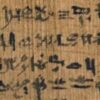Author: Jonathan Green
-

III. What Joseph Smith Knew About Champollion
With the preliminary deliberations out of the way, it’s time for a close look at the GAEL.
-

II. What Joseph Smith Would Have Known About Champollion
Before we get to the heart of my argument – which is coming up next in a long post with a detailed look at what’s in the GAEL – we need to look at what Joseph Smith and his associates would have known about Champollion and the decipherment of Egyptian hieroglyphics by 1835.
-

I. Putting the grammar back in GAEL
Scholars from seemingly every corner of Mormon Studies agree: While working on the Egyptian papyri, Joseph Smith and his associates were either unaware of Champollion’s recent work to decipher Egyptian hieroglyphics, or simply unaffected by the recent advances in Egyptology. Not only is this position untenable, it’s demonstrably incorrect.
-
Firing faculty: some educated guesses
Like most media outlets, Inside Higher Ed isn’t well equipped to report stories about BYU-Idaho – it doesn’t entirely understand that BYU and BYU-Idaho are two different schools, for example. But if I had to read between the lines and make an educated guess, this is what I think is happening.
-
A Centrist Church in a Polarized Age
On most cultural issues, the Church is situated somewhere between the center left and the center right.
-
Stranger People
Season 4 of Stranger Things took a detour inside an exotic world it had never explored before: a Latter-day Saint home in mid-80s Utah.
-

Standing with Babylon
One nice thing about reading the Old Testament and the Book of Mormon together is that it lets us expand our mental geography of Zion into a full cartographic plane.
-

Making Sense of Prophecies (6): Concluding Thoughts
The question “Did Samuel Lutz really write this” is ultimately not as useful as the question of how the prophecy of “Lutius Gratiano” came about, and what function it served for those who kept it in circulation.
-

Making Sense of Prophecies (5): “Lutius Gratiano” in the 20th and 21st centuries
The prophecy of “Lutius Gratiano” has a missing link in its textual history.
-

Making Sense of Prophecies (4): The Origin of “Lutius Gratiano”
With early efforts to locate the text in mind, we can now reconstruct the origin of the prophecy of “Lutius Gratiano.”
-

Making Sense of Prophecies (3): Reconsidering “Lutius Gratiano”
In the prophecy of “Lutius Gratiano,” we have the unusual opportunity to observe the formation and development of a prophecy in some detail.
-

Making Sense of Prophecies (2): How to Read a Prophecy
Earlier scholarship has often understood the function of prophetic texts as providing information about the future.
-

Making Sense of Prophecies (1): Preliminaries
For several years, my academic research has focused on late medieval and early modern prophecies.
-
Ruf aus der Wüste 5.3: Hyde on Missouri
The experience of persecution in Missouri was not just recent history. For Hyde, it was the literal fulfillment of prophecy about the last days.
-
We did okay
If you survey the damage left by Donald Trump and Covid-19 in our neighborhood of the American religious landscape, a sigh of relief is warranted.
-
Ruf aus der Wüste 5.1: Hyde on the end time
Hyde touches on his own life and perspective for the first time.
-
Home MTC is good
At some point in the near future, the Missionary Training Center will likely reopen fully, and in some ways that’s unfortunate, because home MTC is good.
-
Ruf aus der Wüste 4.15-16: Hyde on washing of feet
I think this is more about foot washing than I’ve ever read anywhere before.
-
Translating the faith healer
Was I comfortable with the topic? the prospective client on the other end of the video call wanted to know.
-
Ruf aus der Wüste 4.13-14: Hyde on the Sabbath
Article 13 On prayer and on the manner of worship. Prayer is one of the primary obligations of the Christian, and he is reliant on it for any consideration that might stir his ambition or instill it in him, for it is just as necessary for his growth and thriving as rain is for the…
-
Ruf aus der Wüste 4.12: Baptism for the dead
Orson Hyde blazes the trail for every Temple and Family History consultant ever since.
